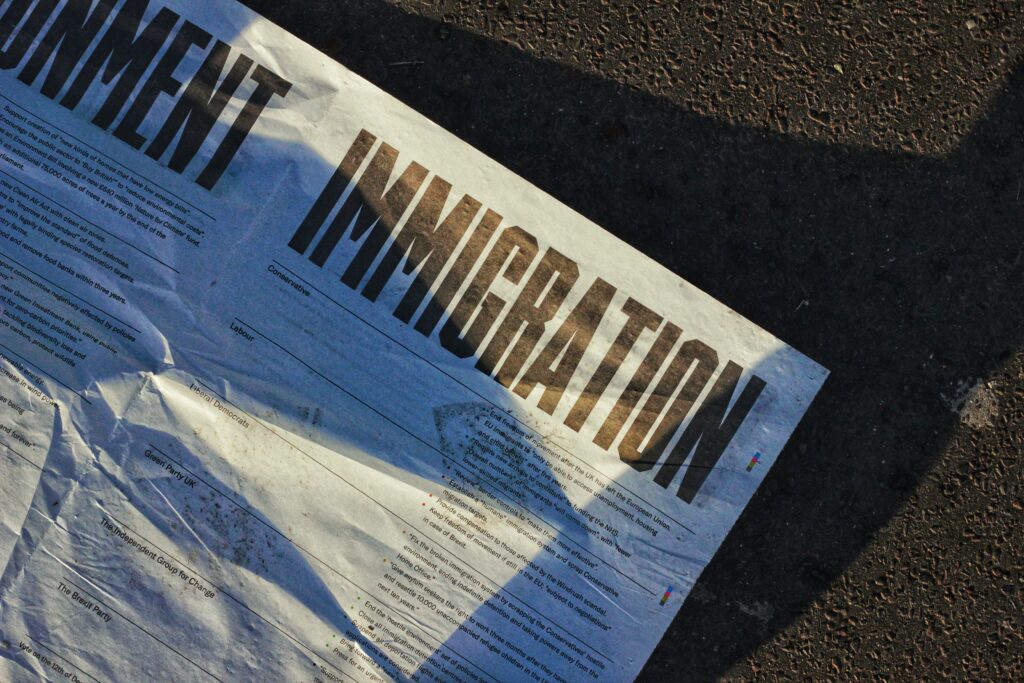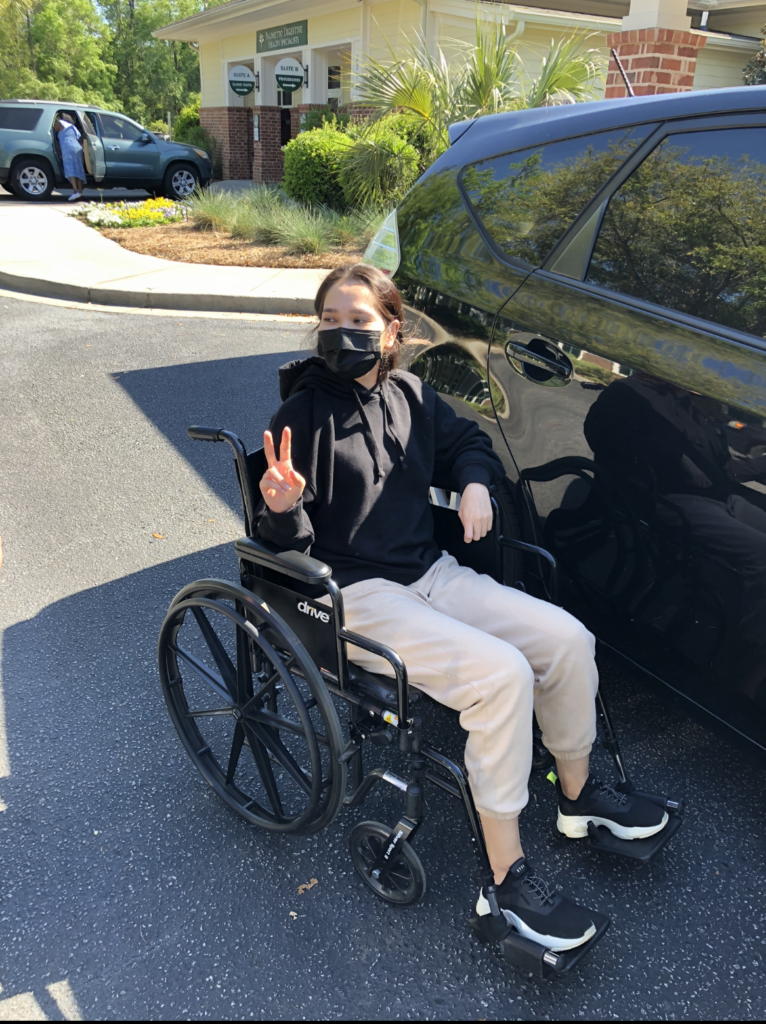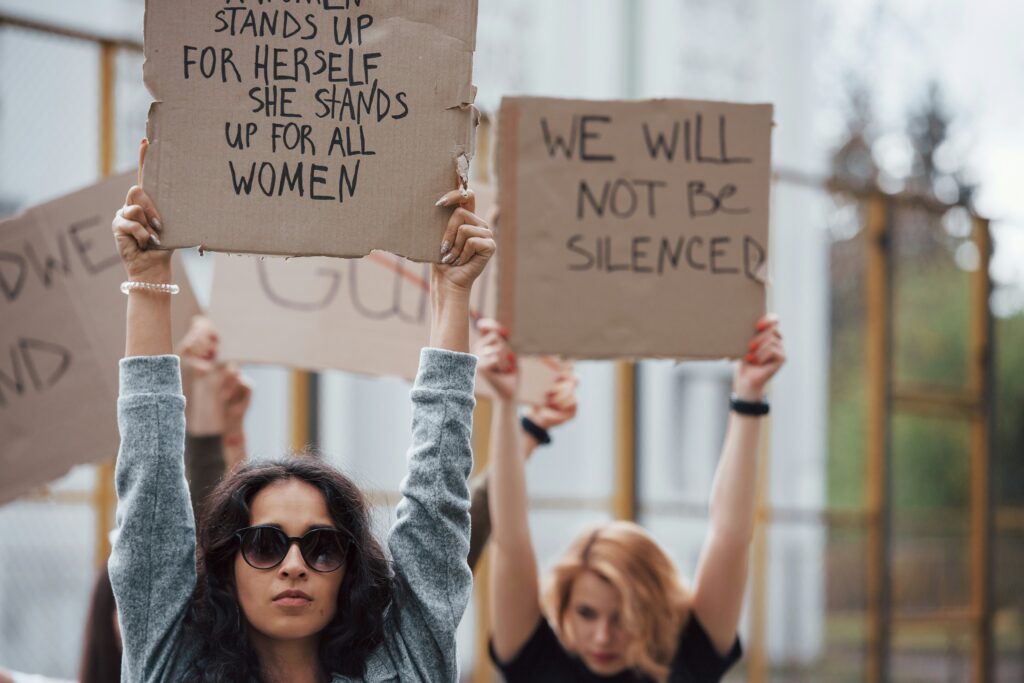As an immigrant woman of colour, Jahan Taganova endured workplace abuse, systemic discrimination, and the hardships of Trump’s America. Now empowered with her voice and resilience, she calls for justice, equity, and dignity for immigrant workers in a deeply divided nation.
Written by Jahan Taganova
November 6, 2024. We woke up to the news: Donald Trump was elected the 47th President of the United States. My heart pounded; a wave of panic closed around my chest, stealing my breath. I wanted to scream until my voice gave out — instead, I found myself paralysed, suspended in a state of disbelief.
Trump’s re-election by popular vote means that, once again, the immigrants coming from the “dungeons of the Third World” — must brace themselves for renewed crackdowns, mass deportations, blatant discrimination, and being treated as “animals.” I am one of those “animals.”
In 2016, Trump’s rallying cry was to build a “big, beautiful wall” along the US-Mexico border to keep out immigrants, whom he described as “poisoning the blood” of the United States. Indeed, as soon as he gained power, Trump swiftly signed an executive order banning people from six Muslim-majority countries from entering the US. Additionally, Immigration and Customs Enforcement (ICE) carried out sweeping deportation raids, arresting immigrants, including outside church shelters.
Having lived through both a totalitarian regime in Turkmenistan and Trump’s previous presidency, I understand how the leader of a nation can influence the values and behaviours of its citizens. A leader who promotes misogyny, sexism and xenophobia sets the tone for a society to mirror those attitudes. The moral decay of such leadership emboldens the darker “isms” within some individuals, leading to widespread cruelty and a blatant disregard for human rights.
Truly, living in America as an immigrant Muslim woman of colour from the “Third World” during Trump’s first reign felt like navigating a minefield — constantly under threat and burdened by the unrelenting anxiety of making a wrong move.

Surviving double the crises: COVID-19 and Trump’s reign
“Putain,” my male boss cursed at me in French over Skype. I froze, unsure if I had heard it correctly.
“Did he just call me a whore?” The thought spiralled through my mind as a lump of anxiety tightened in my chest, making it hard to breathe. This new relational dynamic was solidified for me the moment my boss pointed out he had made a “special effort” to sign my Optional Practical Training (OPT) paperwork.
And in that moment, I truly did believe I had won the jackpot — because, like many others, I graduated in 2020 into a stunted economy marked by a 14.7% unemployment rate due to the COVID-19 pandemic. Getting hired anywhere felt like a stroke of luck – even if the person I reported to treated me like this.
Meanwhile, global border closures due to the pandemic left me stranded, making it impossible to return to Turkmenistan. At this time, I had been a student in the US for a year, pursuing a joint degree in water cooperation and diplomacy. Despite these personal accomplishments, I never felt more vulnerable, and I was desperate not to lose my job and end up stranded or undocumented. As a result, I endured it all – the curses my boss would verbally shower upon me and other colleagues from the Global South.
Before this job, I was a relatively healthy individual. After just one year of working, however, I found myself in a dark place. Ten-hour workdays hunched over a computer left me with scoliosis, a condition I still struggle with to this day. The chronic anxiety of this toxic environment triggered Irritable Bowel Syndrome (IBS), body inflammation and the development of three benign tumours in my body. My American friends urged me to take breaks, go for walks, or try some form of exercise, but even a lunch break felt like an unattainable luxury.
In the so-called “new normal” of the COVID lockdown period and under Trump’s America, my boss monitored my Skype status relentlessly, ensuring it always stayed “green.” Every hour brought another check-in, and stepping away — even for the bathroom — felt like a gamble.
In the so-called “new normal” of the COVID lockdown period and under Trump’s America, my boss monitored my Skype status relentlessly, ensuring it always stayed “green.” Every hour brought another check-in, and stepping away — even for the bathroom — felt like a gamble.
As an immigrant woman already navigating the challenges of immigration, the compounded stress of isolation during the COVID-19 pandemic felt like too much. I navigated the restrictions and requirements of being an immigrant in the US, coupled with workplace macroaggressions and micromanagement. I felt my health decline as a result.
Isolation, according to research published in the European Heart Journal, a journal from the European Society of Cardiology (ESC), can significantly disrupt the body’s hormonal balance, especially stress hormones like cortisol, exacerbating both mental and physical health conditions. For me, this combination created a perfect storm of external pressures and internal turmoil, pushing my resilience to its limits.
Working on weekends – unpaid – during the pandemic became an unspoken expectation, grinding down at my health and spirit. I complied with every request, working around the clock. This impinged on my personal life but I never spoke up — even if my feelings were hurt or dignity trampled.

“Smile through your tears. Swallow your pain.” These words became my mantra.
Turkmen women are taught to endure life’s hardships with silent dignity, not through blind rage, believing that suffering is the essence of strength. So, I found myself falling into this rigid decorum, embracing a false sense of resilience. Eventually, I found myself crying every day. My anxiety attacks grew longer and more intense, the sobbing more violent and uncontrollable.
Yet, as I closed my laptop after another 10-hour workday, the pressure didn’t stop. I had to push through my tears to work for another 3-4 hours, writing research papers, preparing for interviews, and rehearsing webinars — all in pursuit of qualifying for my EB-2 National Interest Waiver (NIW) visa. This visa is an employment-based immigration pathway that allows foreign nationals with exceptional abilities to bypass the labour certification requirement for a green card, provided their work is deemed significantly beneficial to the US. I knew I couldn’t rely on my employer to sponsor a green card, so I had to take this paperwork-laden (and often unreliable route) to secure my future.
This climate of uncertainty and fear left me with no room to voice concerns, forcing me to tolerate exploitation while keeping my mouth shut. Given that my legal status in the US depended entirely on my employer, I had little choice.
“Migrant workers and visa-holders in U.S. workplaces, particularly women and non-binary workers, face intersecting challenges that may extend beyond the discrimination commonly associated with immigrant status or gender. These include heightened vulnerability to exploitation due to precarious visa conditions, limited access to legal protections, and barriers to upward mobility, all of which compound systemic inequities and can hinder economic and social inclusion,” said Andrea Ackerman, specialist working in labor rights and migration issues.
I eventually changed jobs, and while the first six months at the new place felt like a “love story,” I soon encountered institutional racism. Interestingly, my boss, an immigrant woman of colour herself, seemed to feel the need to “punch down” to secure her place in a system designed for exclusion. In my opinion, this behaviour reflects how oppressed individuals internalise the dominant group’s structures as a survival mechanism, leading them to adopt the worldview of their oppressors and perpetuate inequality as they gain power within the same hierarchical systems.
The internalisation of oppression can lead the colonised to replicate the violence and exclusionary practices of their former oppressors once they gain power. Once again, the culture set forth by leadership policies and attitudes sunk its teeth into how I was treated as an immigrant, a woman, and a professional.
Finding my voice, raising my values
Working in this toxic American culture, I quickly learned that when you are an immigrant woman of colour coming from a country such as Turkmenistan, your colleagues often assess you as incapable, regardless of your experience or credentials. My heart broke while drafting an employment contract for my American colleague, who only had a secondary education diploma. They would be making a higher salary than me even though I had two master’s degrees from reputable US universities and years of professional experience.
It should not come as a surprise that immigrants in the US face an array of systemic barriers to economic mobility. As a result, we earn 40% less than our native-born colleagues, and it takes us years to achieve income parity. In the US, it is culturally acceptable for employees to negotiate a higher salary.
For an immigrant woman coming from a deeply patriarchal and more conservative society, negotiating a salary is a completely foreign concept. Many immigrants like myself find it culturally inappropriate to advocate for a better salary for ourselves, so we settle for significantly lower incomes than what we should.

But to corporate America, this is a personal problem, not an aspect of my job and rights that should be explained and respected. I felt obligated to keep my head down and my mouth shut, even when inconsistencies I did not understand arose in the professional sphere. After all, a good Turkmen woman keeps her opinions to herself. But perhaps I was no longer a “good Turkmen woman.” Emeli Sandé sings in her song “Read All About It”:
I’ve got the words to change a nation,
but I had to bite my tongue.
I’ve spent a lifetime stuck in silence…
I wanna shout, I wanna scream till the words dry out.
So, put it in all of the papers.
Indeed, I spent too long in silence, swallowing my truth and being afraid. Now that I’ve finally received my green card, I’m reclaiming my voice. I refuse to stay silent while injustice and human rights violations loom on the horizon in the US, jeopardising its democracy.
As a Turkmen woman who has navigated the US immigration system, survived the treacheries of misogynistic and sexist leadership, and overcome systems built to put me down and people like me at a disadvantage, I’m no longer afraid. I’ve had enough of cushioning the truth, of trying to make it more palatable.
Now, I speak without hesitation. I’m embracing my anger, as bell hooks once suggested — redirecting it in ways that empower me to resist oppression and foster healing rather than allowing it to perpetuate harm.
I recognise that my story is not just my own; it is part of a larger tapestry shared by countless immigrants drawn to this democratic nation in pursuit of life, liberty, and happiness. It’s about more than what is immediately visible. It’s about the unspoken, the unseen — the ignored and marginalised issues that remain hidden but manifest in profound suffering, systemic discrimination, violence, and countless other forms of oppression.
By shedding light on my experiences, I hope to amplify our collective voice and inspire other immigrants, especially those from Central Asia, to share their own experiences. It’s about the power of speaking freely and unapologetically, even when the world tries to silence us. Our voices matter, and it’s time we stand up for our stories. Each of us has the right to be heard and to provide a counternarrative to Trump’s degrading views on immigrants and our lived experiences.
Perhaps most importantly, I tell my story so that those in my shoes will never have to endure being called a “putain” by their boss, regardless of their immigration status.

He’s Back: The Fight for Immigration
Although my initial optimism about the American dream — living in a democracy and enjoying freedoms I had never been granted before — began to fade, Biden’s presidency rekindled a glimmer of hope. Under his administration, my EB-2 NIW application was approved within just two business days through premium processing.
Now, Trump’s return to power feels like a renewed assault on the dignity of those he has long disparaged — immigrants. For me, and for many immigrants from the so-called “shithole countries” he ridicules, his re-election isn’t merely a political event; it’s a profound betrayal by those who chose not to stand up for the marginalised or defend our human rights. As Missing Perspectives contributor Kashvi Chandok aptly notes, re-electing Trump is more than just a political shift — it feels like an endorsement of misogyny, racism, and hostility toward immigrants.
Trump’s re-election is expected to trigger major shifts in immigration policy, impacting not only irregular immigration but also regular immigration processes, such as green cards and H-1B visas. The president-elect has already vowed to declare a national emergency to fulfil his promise of mass deportations of undocumented immigrants living in the US.
“Even victims of human trafficking, who by definition are enslaved and unable to leave, will be at risk toward arrest and deportation despite the legal protections afforded to them by the Trafficking Victims Protection Act,” said Andrea Powell, founder and president of Karana Rising, an organisation that provides empowering services and education to survivors of human trafficking.
Experts predict that upon taking office, Trump may issue a series of executive orders, potentially ending programs like Temporary Protected Status (TPS), Deferred Action for Childhood Arrivals (DACA), and the Parole-in-Place (PIP) expansion under the Biden administration. Additionally, he is likely to reinstate policies from his previous term, such as the “Remain in Mexico” initiative, administered by the Department of Homeland Security, which requires migrants seeking asylum to remain in Mexico until their US immigration court date.
“The rise in workplace exploitation of immigrants is driven by fear, language barriers, and the threat of deportation, with employers taking advantage of their vulnerability to enforce substandard working conditions. As anti-immigrant policies intensify, these predatory practices will likely escalate, backed by a government that empowers such abuses,” said attorney Mason Walker of Walker Immigration, a law firm specialising in securing a US work visa for foreign-born physicians.
Trump’s anti-immigration policies are expected to result in an increase in H-1B visa denials, alongside a rise in bureaucratic obstacles for immigrants navigating the employment-based immigration system.
“While it’s too early to say exactly what the impacts on business immigration will be as a result of a second Trump [term], if his last term was any indication, at the very least we’ll see an increase in Requests for Evidence on even the most straightforward of visa petitions, including H-1Bs,” said Sari Long, a Colorado-based attorney at Faegre Drinker, a law firm specialising in complex legal matters for clients ranging from startups to multinational corporations.
When Trump took office in 2017, his administration’s immigration policies caused H-1B denial rates for initial employment to skyrocket, reaching 24% in FY 2018 and 21% in FY 2019. Furthermore, Trump frequently invoked Section 212(f) of the Immigration and Nationality Act to limit the entry of both immigrants and temporary visa holders.
As a woman who lived through an unbridled dictatorship back in Turkmenistan, I’ve experienced firsthand how authoritarian regimes stifle dissent, reduce women to second-class citizens, and meet resistance with unrelenting brutality. Now, witnessing similar struggles unfold in the US, I am struck by an eerie déjà vu.
I strongly believe that when the leader of a nation openly promotes racism, xenophobia, and sexism, it creates a hostile environment that employers exploit. They weaponise the fear of deportation to maintain power and control, perpetuating cycles of abuse and silencing victims. This climate makes it even more terrifying for individuals to seek help or protection. Such macroaggressions are known to “reinforce white privilege and erode a culture of inclusion.” But more than this, they erode physical and mental health, destroying the productivity and diversity of a nation and preventing true authenticity in both its citizens and immigrants alike.
As we face another Trump presidency, I hope Diversity, Equity, and Inclusion (DEI) professionals shift their focus toward the most vulnerable — immigrant workers. These are the very individuals Trump has relentlessly antagonised and ridiculed and who find themselves less safe than they had hoped, with heightened uncertainty about their futures.
Now, more than ever, the US must intensify efforts to combat discrimination and macro and microaggressions and address abuse and exploitation. It is crucial to double down on employers and employees alike to ensure a culture of respect both in and out of the workplace. This culture includes ensuring immigrant workers are paid a fair wage and guaranteeing their dignity and rights are upheld.

While it is the job of the leaders of an organisation to set the tone for a safe employment culture, employees with privilege can help disrupt harmful and oppressive systems.
“When the culture at large runs on the fuel of division and exclusion, it becomes the personal responsibility of decision-makers to take ownership of how their organisation’s microcosm reflects and mimics the macrocosm of the nation so that the work of fostering something healthier, something safer, something more humane is not overlooked,” said Ayna Meredova, a trauma-informed DEI Culture of Belonging Cultivator and Founder of Groove Culture Collective.
I may have endured my share of dictators and unfit leaders, but I will never be reduced to the powerlessness I once felt as an immigrant. Never again will I compromise my mental and physical health at the hands of a bully who felt the culture of xenophobia was acceptable in today’s world – and in this democratic country built on liberty and the pursuit of happiness. As I prepare for the next four years of a Trump presidency, I am ready to take a stand for what I know I deserve, and I am more than prepared to stand up for those who have been in my shoes.
Feature image: Colin Lloyd at @Unsplash
If you or someone you know is in immediate danger or in need of urgent protection, call the police on 999.
For more info on where to find help, click here.

Jahan Taganova, originally from Turkmenistan, is a dedicated public servant living in the US. In addition to her full-time work in local government, where she works on addressing the impacts of climate change as a Climate Adaptation Specialist, she is a passionate writer who advocates for equity, human rights, and climate resilience. As the recipient of multiple full-ride scholarships and prestigious awards from US institutions, Jahan is committed to giving back to the community and country that invested in her education and development.



